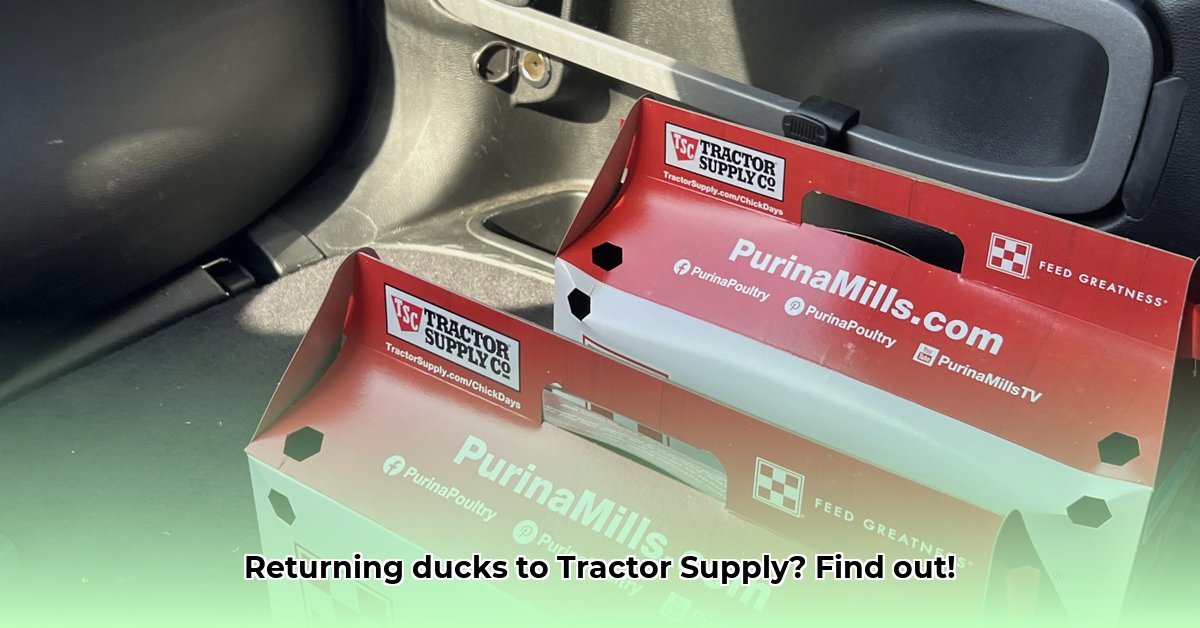
Understanding Tractor Supply's Return Policy: The Fine Print
Let's address the elephant in the coop: Tractor Supply does not accept returns on live animals, including ducks. Their policy, while straightforward, lacks clarity regarding exceptional circumstances like illness or unexpected death. This lack of recourse underscores the importance of thorough preparation before purchasing. This means your ducks' well-being becomes your sole responsibility from the moment you bring them home. For more information on Tractor Supply's livestock offerings, see this helpful resource: [Tractor Supply Livestock]. For additional resources on raising turkeys, check out this helpful guide.
Before You Buy: Duck Preparedness 101
Acquiring ducks, whether from Tractor Supply or a local breeder, requires meticulous planning. Think of it as welcoming a new, feathered family member!
- Breed Selection: Research breeds suited to your climate and farming goals (egg laying, meat production). Consult reputable resources and experienced poultry keepers for advice. Improper breed selection can lead to increased health problems and lower productivity.
- Housing & Environment: Ducks need secure, spacious housing, protected from predators and harsh weather. Consider climate control and adequate ventilation to prevent disease. Poor housing conditions increase the risk of stress, illness, and mortality.
- Veterinary Care: Identify an avian veterinarian before purchasing ducks. Having a vet's contact information is crucial for prompt treatment of any health issues. Proactive veterinary care can significantly reduce risks.
- Biosecurity: Learn about biosecurity protocols, including quarantine procedures for new arrivals to prevent disease spread within your flock. Neglecting biosecurity increases the risk of outbreaks and significant flock losses.
Post-Purchase Care: Keeping Your Ducks Healthy
Bringing home your ducks is just the beginning. Diligent care is essential for their well-being.
- Quarantine: Isolate new ducks from your existing flock for at least 30 days to observe for signs of illness. This crucial step can prevent the rapid spread of disease throughout your entire flock.
- Daily Monitoring: Observe your ducks daily for any changes in behavior, appetite, or droppings. Early detection of illness is key to successful treatment.
- Nutrition: Provide a balanced diet appropriate for your duck breed and life stage. Improper nutrition weakens the immune system, increasing vulnerability to diseases.
- Hygiene: Maintain a clean and dry environment. Regular cleaning and disinfection of housing and equipment are essential for disease prevention. Good hygiene significantly reduces the risk of bacterial and parasitic infections.
Dealing with Unexpected Issues: Illness, Injury, or Death
Despite your best efforts, health problems can arise. Remember, Tractor Supply doesn't offer returns for ill or deceased ducks, making proactive measures crucial.
- Veterinary Consultation: Contact your avian veterinarian immediately if a duck shows signs of illness or injury. Prompt veterinary attention significantly improves the chances of successful treatment and recovery.
- Alternative Solutions: If immediate veterinary access is unavailable, consult with experienced poultry keepers in your area. Seeking multiple sources of information broadens your options for addressing the problem.
- Disease Management: Learn to recognize and address common duck diseases. Knowledge empowers you to take preventative measures and respond effectively to health challenges.
Alternative Sourcing Strategies: Finding Healthy Ducks
Consider sourcing ducks from local breeders or farmers' markets. These sources often provide more support and guidance, building a relationship that extends beyond the initial transaction. This personalized approach often results in healthier birds and better support throughout your duck-raising journey.
Conclusion: Responsible Duck Ownership for Success
While Tractor Supply offers convenience, its live animal return policy should underscore the importance of thorough research, planning and responsible animal ownership. By prioritizing proactive care and seeking support from experienced poultry keepers, you increase your chances of successful small-scale farming and happy, healthy ducks. Remember, it's a commitment, not just a purchase.